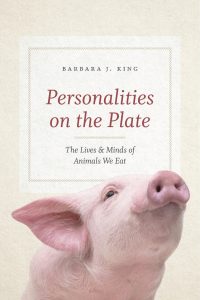Barbara J. King on the legal status of animals

From an interview with Barbara J. King at Nonhuman Rights Blog:
So far in our litigation, no court has challenged the idea that chimpanzees are self-aware, autonomous beings; a New York appellate court judge even called the NhRP’s affidavits from scientists “very impressive.” And yet, all the same, our chimpanzee clients remain legal “things” with no rights even though science and law suggest they should be recognized as legal “persons” with fundamental rights. How might you account for this gap between the science of animal cognition and emotion and animals’ legal status? Why do you think the law is still lagging behind the science as far as animals are concerned?
The idea of animals as property or as things is so deeply entrenched in Western systems of law; it’s hard to shake that loose from what years of animal-behavior, anthropology, and psychology studies tell us about chimpanzees as able to reason, remember, plan, suffer, and take into account factors that affect their own well-being.
In thinking about the “why,” I remember Steve talking so movingly about this: we know about the not-so-distant past in which human beings other than white men were considered as property or less-than-human in our legal systems. As an anthropologist I think that the human trajectory has been bound up with a tendency to fear what happens when “the other” (as groups in power would construct it) gains rights. I’m not saying that inequality is biologically determined, instead just the opposite: that it is culturally constructed, it happens because the “what if” clause takes root in people’s brains: what if “they” were accorded legal rights, what would I lose?
Of course, I’d turn that question on its head. I would ask what we all would gain if chimpanzees became legal persons. From the perspective of ethics, empathy, and doing the right thing for smart feeling primates who can’t on their own ask for their day in court, we would gain a lot.
***
To read more about Personalities on the Plate, click here.
To read King’s interview in full, click here.